时态和语态
掌握英语语法中的时态和语态

掌握英语语法中的时态和语态时态和语态是英语语法中两个非常重要的概念。
掌握好时态和语态的用法,对于英语学习者来说至关重要。
本文将详细介绍英语语法中的时态和语态,并提供一些例子以帮助读者更好地理解和掌握。
一、时态时态主要表示动作或状态发生的时间。
英语中常用的时态包括一般现在时、一般过去时、一般将来时等。
下面将逐一介绍各个时态的用法和例子。
1. 一般现在时:表达经常、习惯性的动作或状态。
例句:I brush my teeth every morning.(我每天早上刷牙。
)2. 一般过去时:表达过去发生的动作或状态。
例句:He watched a movie last night.(他昨晚看了一部电影。
)3. 一般将来时:表达将来要发生的动作或状态。
例句:She will visit her grandparents next week.(下周她将去看望她的祖父母。
)除了以上的三个基本时态,英语还有一些其他时态,如进行时态、完成时态等。
这些时态用于表达不同的语境和含义,在实际运用中需要根据具体情况进行选择。
二、语态语态表示主语与动作或状态之间的关系。
英语语态主要分为主动语态和被动语态。
下面将介绍主动语态和被动语态的定义和用法。
1. 主动语态:主动语态表示主语是动作的执行者。
例句:She writes a letter.(她写信。
)2. 被动语态:被动语态表示主语是动作的承受者,而不是执行者。
例句:The letter is written by her.(这封信是她写的。
)被动语态通常由助动词be加动词的过去分词构成,而主动语态则直接使用动词的原形。
三、时态和语态的综合运用在实际语言交流中,时态和语态经常会结合起来使用。
下面将给出一些综合运用的例子,以帮助读者更好地理解和掌握。
1. The book was written by him last year.(去年这本书是他写的。
)这个句子使用了过去时态的被动语态,表示过去某个时间点的动作。
英语语法(时态、语态)
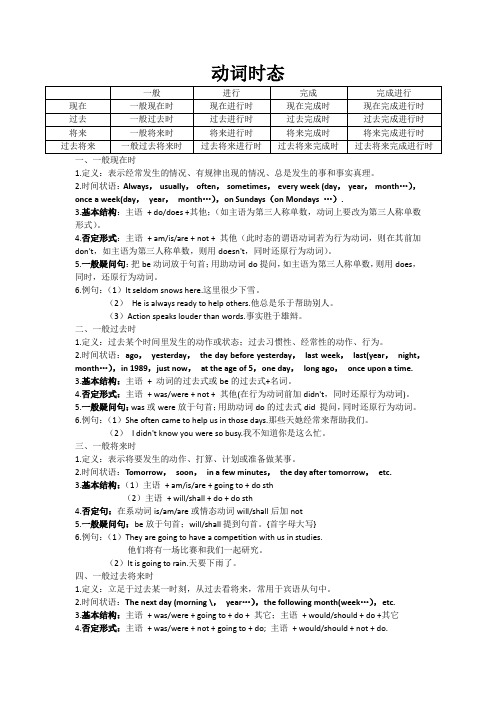
动词时态一、一般现在时1.定义:表示经常发生的情况、有规律出现的情况、总是发生的事和事实真理。
2.时间状语:Always,usually,often,sometimes,every week (day,year,month…),once a week(day,year,month…),on Sundays(on Mondays …).3.基本结构:主语+ do/does +其他;(如主语为第三人称单数,动词上要改为第三人称单数形式)。
4.否定形式:主语+ am/is/are + not + 其他(此时态的谓语动词若为行为动词,则在其前加don't,如主语为第三人称单数,则用doesn't,同时还原行为动词)。
5.一般疑问句:把be动词放于句首;用助动词do提问,如主语为第三人称单数,则用does,同时,还原行为动词。
6.例句:(1)It seldom snows here.这里很少下雪。
(2)He is always ready to help others.他总是乐于帮助别人。
(3)Action speaks louder than words.事实胜于雄辩。
二、一般过去时1.定义:过去某个时间里发生的动作或状态;过去习惯性、经常性的动作、行为。
2.时间状语:ago,yesterday,the day before yesterday,last week,last(year,night,month…),in 1989,just now,at the age of 5,one day,long ago,once upon a time.3.基本结构:主语+ 动词的过去式或be的过去式+名词。
4.否定形式:主语+ was/were + not + 其他(在行为动词前加didn't,同时还原行为动词)。
5.一般疑问句:was或were放于句首;用助动词do的过去式did 提问,同时还原行为动词。
英语中的时态与语态-精讲
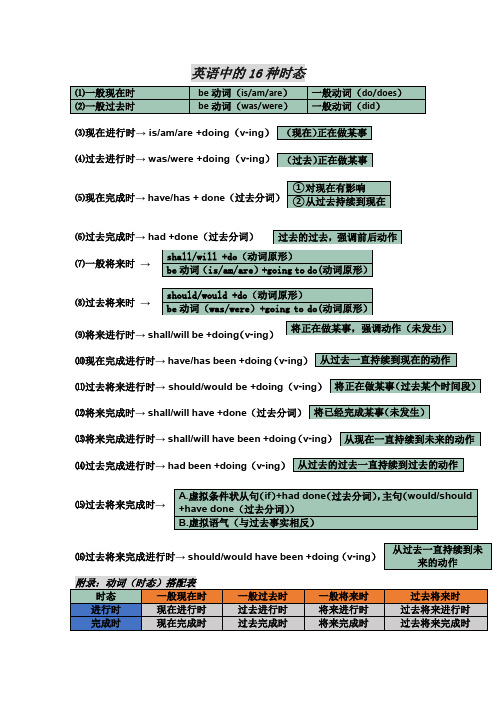
英语中的16种时态⑶现在进行时→ is/am/are +doing (v-ing )⑷过去进行时→ was/were +doing (v-ing )⑸现在完成时→ have/has + done (过去分词)⑹过去完成时→ had +done (过去分词)⑺一般将来时 →⑻过去将来时 →⑼将来进行时→ shall/will be +doing (v-ing )⑽现在完成进行时→ have/has been +doing (v-ing )⑾过去将来进行时→ should/would be +doing (v-ing )⑿将来完成时→shall/will have +done (过去分词)⒀将来完成进行时→ shall/will have been +doing (v-ing )⒁过去完成进行时→had been +doing (v-ing ) ⒂过去将来完成时→⒃过去将来完成进行时→ should/would have been +doing (v-ing )16种时态中的被动语态主动:A + 一般动词(do )+ B被动:B + be done (过去分词)+ by Aeg. You play basketball.⑴一般现在时:The by you.→⑵一般过去时:→⑶现在进行时:The by you.→⑷过去进行时:The by you.→⑸现在完成时:The by you.→⑹过去完成时:The by you.→⑺一般将来时:The by you.→⑻过去将来时:The by you.→⑼将来进行时:The by you.→⑽现在完成进行时:The by you.→⑾过去将来进行时:Theby⑿将来完成时:The by you.→⒀将来完成进行时:Theby you.→⒁过去完成进行时:The by you.→⒂过去将来完成时:The by you.→⒃过去将来完成进行时:Theby you.注:红体字部分为常用时态的被动形式附录:动词(被动形式)搭配表。
(完整版)高中语法之常用时态语态详解

第四章时态和语态一.动词的时态英语时态用共有十六种时态,其中常用的有8种,它们是:一般现在时、一般过去时、一般将来时、现在进行时、现在完成时、过去进行时、过去完成时和过去将来时。
一. 一般现在时.1.构成. be动词:am is are ; 其他动词用动词原形,当主语是第三人称单数时要在谓语动词后加“s”,其变化规则与名词变复数一致。
2.用法. 1). 经常性或习惯性的动作,常与表示频度的时间状语连用。
如usually, always, often, seldom, never, every...,eg. I leave home for school at 7 every morning.I don’t leave home for school at 7 every morning.Do I leave home for school at 7 every morning?He usually gets up early.He doesn’t usually get up early.Does he usually get up early?2) 客观真理,客观存在,科学事实。
eg. The earth moves around the sun.The earth doesn’t move around the sun 否定句Does the earth move around the sun? 疑问句Shanghai lies in the east of China.Shanghai doesn’t lie in the east of China 否定句Does Shanghai lie in the east of China? 疑问句Water boils at 100 centigrade degrees.3) 表示格言或警句中eg. Pride goes before a fall.注意. 此用法如果出现在宾语从句中,即使主句是过去时,从句谓语也要用一般现在时。
16种时态及语态总结
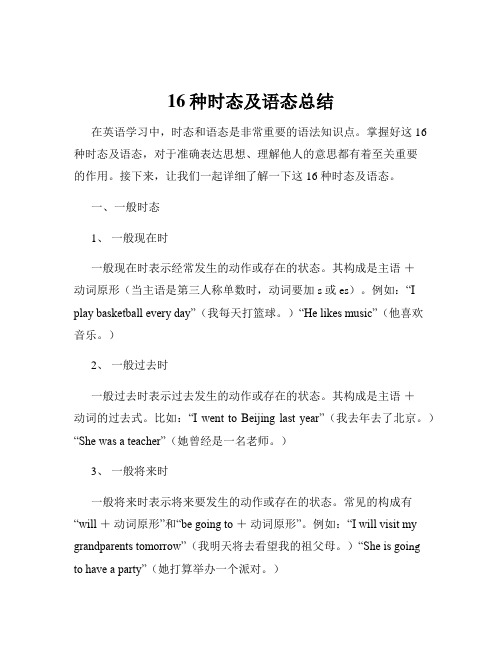
16种时态及语态总结在英语学习中,时态和语态是非常重要的语法知识点。
掌握好这 16 种时态及语态,对于准确表达思想、理解他人的意思都有着至关重要的作用。
接下来,让我们一起详细了解一下这 16 种时态及语态。
一、一般时态1、一般现在时一般现在时表示经常发生的动作或存在的状态。
其构成是主语+动词原形(当主语是第三人称单数时,动词要加 s 或 es)。
例如:“I play basketball every day”(我每天打篮球。
)“He likes music”(他喜欢音乐。
)2、一般过去时一般过去时表示过去发生的动作或存在的状态。
其构成是主语+动词的过去式。
比如:“I went to Beijing last year”(我去年去了北京。
)“She was a teacher”(她曾经是一名老师。
)3、一般将来时一般将来时表示将来要发生的动作或存在的状态。
常见的构成有“will +动词原形”和“be going to +动词原形”。
例如:“I will visit my grandparents tomorrow”(我明天将去看望我的祖父母。
)“She is goi ngto have a party”(她打算举办一个派对。
)二、进行时态1、现在进行时现在进行时表示现在正在进行的动作。
其构成是“be(am/is/are)+现在分词”。
例如:“I am reading a book now”(我现在正在读书。
)2、过去进行时过去进行时表示过去某个时刻正在进行的动作。
其构成是“was/were +现在分词”。
比如:“He was playing football at this time yesterday”(昨天这个时候他正在踢足球。
)3、将来进行时将来进行时表示将来某个时刻正在进行的动作。
其构成是“will be +现在分词”。
例如:“I will be studying English at 8 o'clock tomorrow evening”(明天晚上 8 点我将正在学习英语。
英语八种时态及语态

英语八种时态及语态一.现在进行时态(正在进行)1.结构:Be + V- ing . 被动语态结构am/is /are + being+ p.p2.关键词;look , listen , now, at the moment , at presente. g The students ----------( play ) at five o’clock in the afternoon.二.一般现在时态(经常性,反复性)1.结构 A. be型am/ is are + n / adj/ prep phrase被动语态结构am/is/are +p.pe. g I am a student . / He is tired . / They are at home.一般疑问句将be 提前,否定句在be 后加not.B.行为动词:1). S+ V (主语除第三人称单数)e. g We study English. / Do you study English ? / We don’t study English. 一般疑问句加助动词do ,否定句加助动词don’t.They do their homework. / Do they do their homework ? / They don’t do their homework.2). S + V(单三)。
主语是第三人称(he, she, your mother, lily); 动词第三人称变化相当于名词变复数。
E. g His brother studies hard every day. /Does his brother study hard every day ?His brother doesn’t study hard every day.一般疑问句在加Does, 否定句加doesn’t. 后要还原动词原形。
e. g Her sister does some cooking in the evening. / Does her sister do some cooking in theevening .? Her sister doesn’t do some cooking in the evening.3. 关键词:every day ( week / month / year) / in the morning ( afternoon / evening)On Monday (s) at weekend (s)Always /often / usually /sometimes= at times. Once a week (how often)三.一般过去时态(过去的动作,状态)1.结构。
英语中的时态和语态

英语中的时态和语态时态和语态是英语语法中非常重要的概念。
掌握时态和语态对于正确理解和运用英语语言至关重要。
本文将深入探讨英语中的时态和语态,帮助读者更好地掌握这两个概念。
一、时态时态是表示动作或状态发生的时间的一种语法形式。
英语中有12种基本时态,分为三个时态组:一般时态、进行时态和完成时态。
1. 一般时态一般时态用于表示习惯性、经常性或普遍性的动作或状态。
它包括简单现在时、简单过去时和简单将来时。
- 简单现在时:表示现在的状态或经常性的动作。
例如:“I eat breakfast every morning.”(我每天早上吃早餐。
)- 简单过去时:表示过去发生的动作或状态。
例如:“She studied English last night.”(她昨晚学习了英语。
)- 简单将来时:表示将来发生的动作或状态。
例如:“They will go to the beach tomorrow.”(他们明天将去海滩。
)2. 进行时态进行时态用于表示正在进行的动作。
它包括现在进行时、过去进行时和将来进行时。
- 现在进行时:表示现在正在进行的动作。
例如:“I am reading a book ri ght now.”(我正在读一本书。
)- 过去进行时:表示过去某一时间点正在进行的动作。
例如:“She was cooking dinner at 6 o'clock yesterday.”(昨天6点她正在做晚饭。
)- 将来进行时:表示将来某一时间点正在进行的动作。
例如:“They will be watching a movie at this time tomorrow.”(明天此时他们将在看电影。
)3. 完成时态完成时态用于表示已经完成的动作。
它包括现在完成时、过去完成时和将来完成时。
- 现在完成时:表示过去某一时间点发生的动作对现在造成的影响。
例如:“I have finished my homework.”(我已经完成了作业。
英语的时态与语态

英语的时态与语态时态和语态是英语语法中非常重要的概念,它们对于正确表达和理解英语句子起着至关重要的作用。
在本文中,我们将探讨英语的时态与语态,深入了解它们的用法和区别。
一、时态时态是用来表示动作或状态发生的时间的一种语法形式。
在英语中,一般有过去时、现在时和将来时三种基本时态。
1. 过去时过去时用来表示过去发生的动作或状态。
一般过去时的构成是在动词原形后加上-ed,例如:walked, talked。
但也有一些不规则动词需要特殊记忆,例如:went, saw。
例句:- I walked to the store yesterday.(昨天我走到了商店。
)- She ate lunch an hour ago.(她一个小时前吃了午饭。
)2. 现在时现在时用来表示现在正在进行的动作或状态。
一般现在时的构成是动词原形,但第三人称单数要在动词后加上-s或-es。
例句:- I am reading a book now.(我现在正在看书。
)- He teaches English at the university.(他在大学教英语。
)3. 将来时将来时用来表示将来发生的动作或状态。
一般将来时的构成是在助动词will后加上动词原形。
例句:- I will go to the party tomorrow.(明天我将去参加派对。
)- They will arrive at the airport in two hours.(他们将在两小时后到达机场。
)二、语态语态是用来表示句子的主语和谓语之间的关系的一种语法形式。
在英语中,一般有主动语态和被动语态两种基本语态。
1. 主动语态主动语态表示主语是动作的执行者。
例句:- She wrote a letter.(她写了一封信。
)- He is washing the car.(他正在洗车。
)2. 被动语态被动语态表示主语是动作的承受者。
例句:- The letter was written by her.(这封信是她写的。
(完整)高中英语语法(时态和语态)
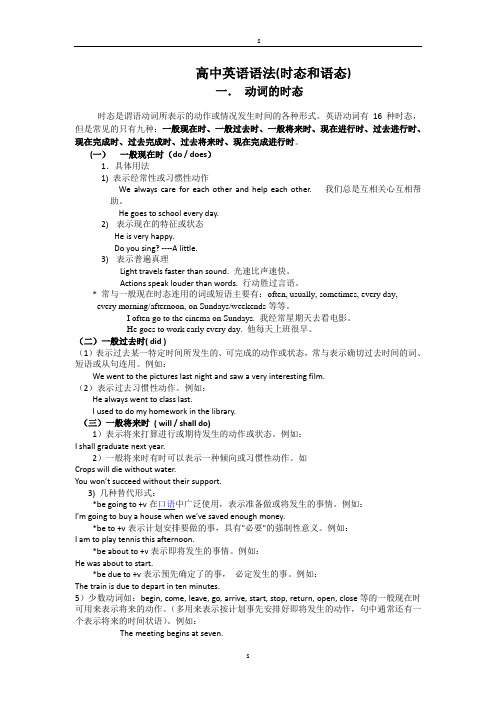
高中英语语法(时态和语态)一.动词的时态时态是谓语动词所表示的动作或情况发生时间的各种形式。
英语动词有16种时态,但是常见的只有九种:一般现在时、一般过去时、一般将来时、现在进行时、过去进行时、现在完成时、过去完成时、过去将来时、现在完成进行时。
(一)一般现在时(do / does)1.具体用法1) 表示经常性或习惯性动作We always care for each other and help each other. 我们总是互相关心互相帮助。
He goes to school every day.2)表示现在的特征或状态He is very happy.Do you sing? ----A little.3)表示普遍真理Light travels faster than sound. 光速比声速快。
Actions speak louder than words. 行动胜过言语。
* 常与一般现在时态连用的词或短语主要有:often, usually, sometimes, every day,every morning/afternoon, on Sundays/weekends等等。
I often go to the cinema on Sundays. 我经常星期天去看电影。
He goes to work early every day. 他每天上班很早。
(二)一般过去时( did )(1)表示过去某一特定时间所发生的、可完成的动作或状态,常与表示确切过去时间的词、短语或从句连用。
例如:We went to the pictures last night and saw a very interesting film.(2)表示过去习惯性动作。
例如:He always went to class last.I used to do my homework in the library.(三)一般将来时( will / shall do)1)表示将来打算进行或期待发生的动作或状态。
英语时态与语态语法讲解
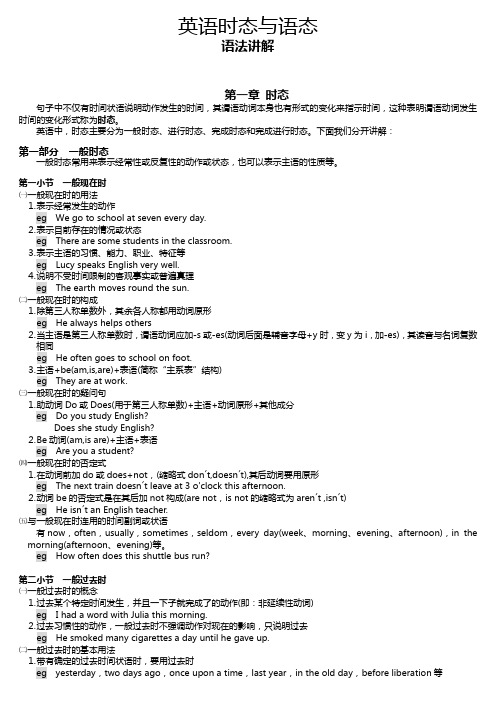
英语时态与语态语法讲解第一章时态句子中不仅有时间状语说明动作发生的时间,其谓语动词本身也有形式的变化来指示时间,这种表明谓语动词发生时间的变化形式称为时态。
英语中,时态主要分为一般时态、进行时态、完成时态和完成进行时态。
下面我们分开讲解:第一部分一般时态一般时态常用来表示经常性或反复性的动作或状态,也可以表示主语的性质等。
第一小节一般现在时㈠一般现在时的用法⒈表示经常发生的动作eg We go to school at seven every day.⒉表示目前存在的情况或状态eg There are some students in the classroom.⒊表示主语的习惯、能力、职业、特征等eg Lucy speaks English very well.⒋说明不受时间限制的客观事实或普遍真理eg The earth moves round the sun.㈡一般现在时的构成⒈除第三人称单数外,其余各人称都用动词原形eg He always helps others⒉当主语是第三人称单数时,谓语动词应加-s或-es(动词后面是辅音字母+y时,变y为i,加-es),其读音与名词复数相同eg He often goes to school on foot.⒊主语+be(am,is,are)+表语(简称“主系表”结构)eg They are at work.㈢一般现在时的疑问句⒈助动词Do或Does(用于第三人称单数)+主语+动词原形+其他成分eg Do you study English?Does she study English?⒉Be动词(am,is are)+主语+表语eg Are you a student?㈣一般现在时的否定式⒈在动词前加do或does+not,(缩略式don´t,doesn´t),其后动词要用原形eg The next train doesn´t leave at 3 o'clock this afternoon.⒉动词be的否定式是在其后加not构成(are not,is not的缩略式为aren´t ,isn´t)eg He isn´t an English teacher.㈤与一般现在时连用的时间副词或状语有now,often,usually,sometimes,seldom,every day(week、morning、evening、afternoon),in the morning(afternoon、evening)等。
16种时态及语态总结
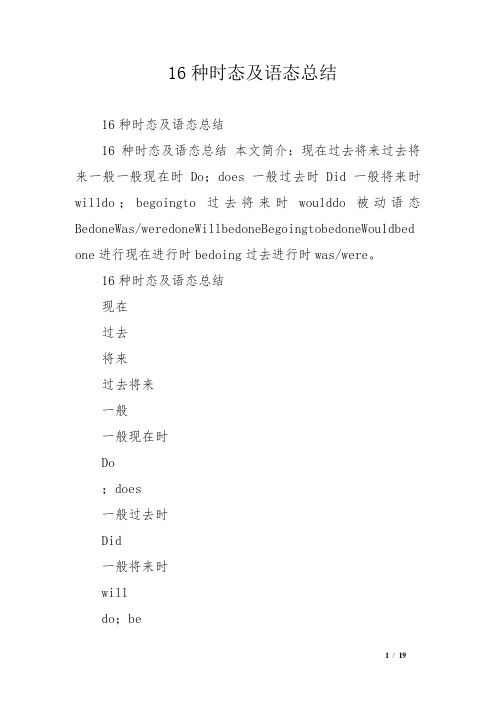
16种时态及语态总结16种时态及语态总结16种时态及语态总结本文简介:现在过去将来过去将来一般一般现在时Do;does一般过去时Did一般将来时willdo;begoingto过去将来时woulddo被动语态BedoneWas/weredoneWillbedoneBegoingtobedoneWouldbed one进行现在进行时bedoing过去进行时was/were。
16种时态及语态总结现在过去将来过去将来一般一般现在时Do;does一般过去时Did一般将来时willdo;begoingto过去将来时woulddo被动语态BedoneWas/were doneWillbedoneBegoingtobedone Wouldbedone进行现在进行时bedoing过去进行时was/were doing将来进行时willbedoing过去将来进行时Wouldhavedone被动语态Am/is/are beingdonewas/were beingdone无被动语态无被动语态完成现在完成时Have/has done过去完成时haddone将来完成时willhavedone过去将来完成时Wouldhavedone被动语态Have/has beendonehadbeendone很少使用被动语态很少使用被动语态完成进行现在完成进行时Have/hasbeendoing过去完成进行时Hadbeendoing将来完成进行时Will/shallhavebeendoing过去将来完成进行时Wouldhavebeendoing被动语态无被动语态无被动语态无被动语态无被动语态时态语态总结说明:1.英语有16种时态,其中常见的有10种;2.一般现在时、一般过去时、一般将来时、过去将来时四种基本时态均有被动语态。
3.现在进行时、过去进行时有被动语态,而将来进行时和过去将来进行时没有被动语态。
4.现在完成时、过去完成时有被动语态,将来完成时和过去将来完成时很少用于被动结构。
16种时态及语态总结
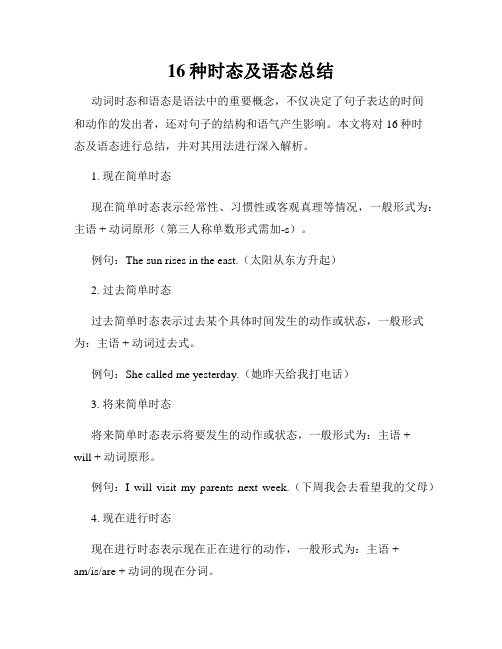
16种时态及语态总结动词时态和语态是语法中的重要概念,不仅决定了句子表达的时间和动作的发出者,还对句子的结构和语气产生影响。
本文将对16种时态及语态进行总结,并对其用法进行深入解析。
1. 现在简单时态现在简单时态表示经常性、习惯性或客观真理等情况,一般形式为:主语 + 动词原形(第三人称单数形式需加-s)。
例句:The sun rises in the east.(太阳从东方升起)2. 过去简单时态过去简单时态表示过去某个具体时间发生的动作或状态,一般形式为:主语 + 动词过去式。
例句:She called me yesterday.(她昨天给我打电话)3. 将来简单时态将来简单时态表示将要发生的动作或状态,一般形式为:主语 +will + 动词原形。
例句:I will visit my parents next week.(下周我会去看望我的父母)4. 现在进行时态现在进行时态表示现在正在进行的动作,一般形式为:主语 +am/is/are + 动词的现在分词。
例句:They are studying in the library now.(他们现在正在图书馆学习)5. 过去进行时态过去进行时态表示过去某一时刻正在进行的动作,一般形式为:主语 + was/were + 动词的现在分词。
例句:I was watching TV when he called me.(他给我打电话的时候,我正在看电视)6. 将来进行时态将来进行时态表示将来某一时刻正在进行的动作,一般形式为:主语 + will be + 动词的现在分词。
例句:She will be studying abroad this time next year.(明年这个时候她将在国外留学)7. 现在完成时态现在完成时态表示过去发生的动作对现在造成的影响或状态,一般形式为:主语 + have/has + 动词的过去分词。
例句:He has already finished his homework.(他已经完成了作业)8. 过去完成时态过去完成时态表示过去某个时间或动作发生之前已经完成的动作,一般形式为:主语 + had + 动词的过去分词。
16种时态及语态总结计划

16种时态及语态总结计划时态和语态是英语中非常重要的语法概念,正确运用时态和语态可以使表达更准确、清晰。
本文将对16种常用时态和语态进行总结和计划。
一、一般现在时态(Simple Present)一般现在时表示经常性、习惯性的行为或真理,常与副词Adverbs of Frequency连用,用于陈述句和客观事实的说明。
例如:I always go to the gym in the morning.They watch movies every weekend.Water boils at 100 degrees Celsius.二、一般过去时态(Simple Past)一般过去时表示过去某个时间点发生的动作或状态,用于陈述句和叙述过去的事件。
例如:She studied abroad last year.We played soccer yesterday.He lived in New York when he was young.三、一般将来时态(Simple Future)一般将来时表示将要发生或打算做的事情,常与时间状语或情态动词连用。
例如:I will visit my grandparents next week.They are going to have a party on Saturday.She might go to the concert if she has time.四、现在进行时态(Present Continuous)现在进行时表示正在进行或暂时,常与现在的临时状态有关,用于陈述句和现场直播等情况。
例如:We are watching a movie right now.He is studying for his exams at the moment.They are traveling around Europe this summer.五、过去进行时态(Past Continuous)过去进行时表示过去某个时间点正在进行的动作,常与过去的时间段、并发时的动作连用。
高考英语时态和语态详解

高考英语时态和语态详解动词的时态和语态一、时态1、一般现在时(do/does; is/am/are)①表示现在的情况、状态或特征。
例:He is a student.他是一个学生。
②表示经常性、习惯性动作。
例:He always helps others.他总是帮助别人。
③客观事实和普遍真理。
例:The earth moves the sun.地球绕着太阳转。
④表示一个按规定、计划或安排要发生的动作。
仅限于某些表示“来、去、动、停、开始、结束、继续”等的动词,可以与表示未来时间的状语搭配使用。
常见的用法是:飞机、火车、轮船、汽车等定期定点运行的交通方式。
例:The next train leaves at 3 o'clock this afternoon.下一趟火车今天下午3点开车。
⑤在时间、条件和让步状语从句中经常用一般现在(有时也用现在完成时)表示将的来事情。
(即:主将从现原则)例:I will call you as soon as I arrive at the airport.我一到机场就会给你打电话。
When you have finished the report, I will have waited for about 3 hours.等你完成这份报告的时候,我就已经等了将近3个小时了。
2、现在进行时(am/is/are doing)①表示此时此刻正在发生的事情。
例:He is listning to the music now.他现在正在听音乐。
②表示目前一段时间内一直在做的事情,但不一定此时此刻正在做。
例:I am studying computer this term.这个学期我一直在学习计算机。
③现在进行时可以表示将来的含义。
瞬时动词的进行一定表将来。
例:I am leaving.我要离开了。
持续动词的进行只有有将来的时间状语或有将来语境中才表将来。
例:I am travelling next month.下个月我要去旅行。
时态和语态的区别和用法

时态和语态的区别和用法时态和语态是英语中非常重要的语法概念,对于学习英语的人来说特别重要。
时态和语态的正确使用能够准确表达出动作发生的时间和动作主体的关系,使语言更加准确、流畅。
本文将详细介绍时态和语态的区别和用法。
一、时态的定义和用法时态表示动作或状态发生的时间。
英语中常用的时态主要包括: 简单现在时、现在进行时、现在完成时、过去时、过去进行时、过去完成时、将来时等。
1. 简单现在时:表示经常、一贯性或普遍性的动作或状态。
例如:I eat breakfast every day.(我每天吃早餐)2. 现在进行时:表示现在时刻正在进行的动作。
例如:They are playing football in the park.(他们正在公园里踢足球)3. 现在完成时:表示过去某个时间点开始、持续到现在的动作。
例如:He has lived in London for five years.(他在伦敦住了五年了)4. 过去时:表示过去某个时间点或某段时间内发生的动作。
例如:She went to the cinema last night.(昨晚她去了电影院)5. 过去进行时:表示过去某个时间点或某段时间内正在进行的动作。
例如:He was studying when I called him.(我给他打电话时,他正在学习)6. 过去完成时:表示过去某个时间点之前已经完成的动作。
例如:They had finished their homework before dinner.(晚餐前,他们已经做完了作业)7. 将来时:表示将来某个时间点或某段时间内将要发生的动作。
例如:I will go shopping tomorrow.(明天我要去购物)二、语态的定义和用法语态表示句中主语和谓语动词的关系,主要包括:主动语态和被动语态。
1. 主动语态:表示主语是动作的执行者。
例如:He wrote a letter.(他写了一封信)2. 被动语态:表示主语是动作的承受者。
时态与语态的区别
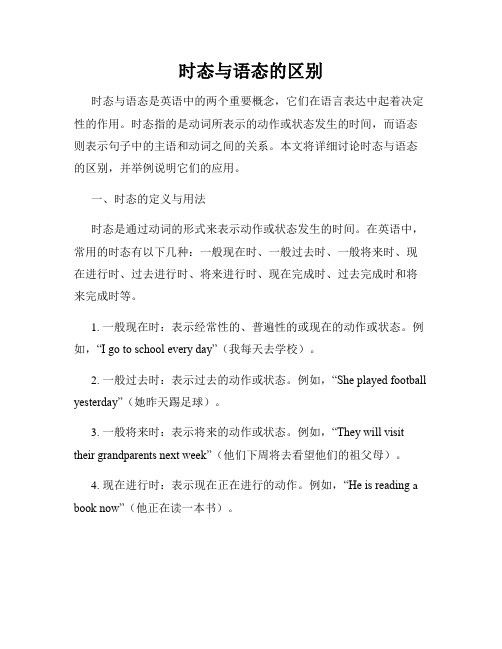
时态与语态的区别时态与语态是英语中的两个重要概念,它们在语言表达中起着决定性的作用。
时态指的是动词所表示的动作或状态发生的时间,而语态则表示句子中的主语和动词之间的关系。
本文将详细讨论时态与语态的区别,并举例说明它们的应用。
一、时态的定义与用法时态是通过动词的形式来表示动作或状态发生的时间。
在英语中,常用的时态有以下几种:一般现在时、一般过去时、一般将来时、现在进行时、过去进行时、将来进行时、现在完成时、过去完成时和将来完成时等。
1. 一般现在时:表示经常性的、普遍性的或现在的动作或状态。
例如,“I go to school every day”(我每天去学校)。
2. 一般过去时:表示过去的动作或状态。
例如,“She played football yesterday”(她昨天踢足球)。
3. 一般将来时:表示将来的动作或状态。
例如,“They will visit their grandparents next week”(他们下周将去看望他们的祖父母)。
4. 现在进行时:表示现在正在进行的动作。
例如,“He is reading a book now”(他正在读一本书)。
5. 过去进行时:表示过去某一时刻正在进行的动作。
例如,“They were playing basketball at 5 o'clock yesterday”(昨天五点钟他们正在打篮球)。
6. 将来进行时:表示将来某一时刻正在进行的动作。
例如,“We will be having a meeting at this time tomorrow”(明天这个时候我们将在开会)。
7. 现在完成时:表示过去某一时间开始,一直延续到现在的动作或状态。
例如,“I have studied English for ten years”(我已经学英语十年了)。
8. 过去完成时:表示在过去某一时间或动作之前已经完成的动作。
例如,“She had finished her homework before she went to bed”(她在睡觉前已经完成了她的家庭作业)。
什么是时态和语态
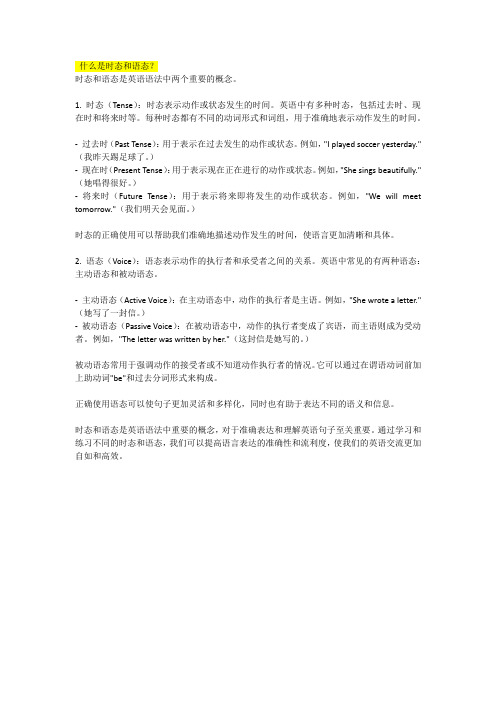
什么是时态和语态?时态和语态是英语语法中两个重要的概念。
1. 时态(Tense):时态表示动作或状态发生的时间。
英语中有多种时态,包括过去时、现在时和将来时等。
每种时态都有不同的动词形式和词组,用于准确地表示动作发生的时间。
-过去时(Past Tense):用于表示在过去发生的动作或状态。
例如,"I played soccer yesterday."(我昨天踢足球了。
)-现在时(Present Tense):用于表示现在正在进行的动作或状态。
例如,"She sings beautifully."(她唱得很好。
)-将来时(Future Tense):用于表示将来即将发生的动作或状态。
例如,"We will meet tomorrow."(我们明天会见面。
)时态的正确使用可以帮助我们准确地描述动作发生的时间,使语言更加清晰和具体。
2. 语态(Voice):语态表示动作的执行者和承受者之间的关系。
英语中常见的有两种语态:主动语态和被动语态。
-主动语态(Active Voice):在主动语态中,动作的执行者是主语。
例如,"She wrote a letter."(她写了一封信。
)-被动语态(Passive Voice):在被动语态中,动作的执行者变成了宾语,而主语则成为受动者。
例如,"The letter was written by her."(这封信是她写的。
)被动语态常用于强调动作的接受者或不知道动作执行者的情况。
它可以通过在谓语动词前加上助动词"be"和过去分词形式来构成。
正确使用语态可以使句子更加灵活和多样化,同时也有助于表达不同的语义和信息。
时态和语态是英语语法中重要的概念,对于准确表达和理解英语句子至关重要。
通过学习和练习不同的时态和语态,我们可以提高语言表达的准确性和流利度,使我们的英语交流更加自如和高效。
时态和语态
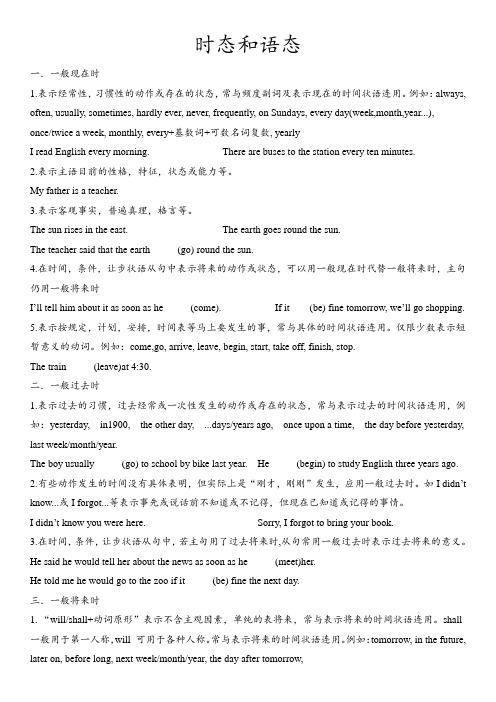
时态和语态一.一般现在时1.表示经常性,习惯性的动作或存在的状态,常与频度副词及表示现在的时间状语连用。
例如:always, often, usually, sometimes, hardly ever, never, frequently, on Sundays, every day(week,month,year...),once/twice a week, monthly, every+基数词+可数名词复数, yearlyI read English every morning. There are buses to the station every ten minutes.2.表示主语目前的性格,特征,状态或能力等。
My father is a teacher.3.表示客观事实,普遍真理,格言等。
The sun rises in the east. The earth goes round the sun.The teacher said that the earth _____(go) round the sun.4.在时间,条件,让步状语从句中表示将来的动作或状态,可以用一般现在时代替一般将来时,主句仍用一般将来时I’ll tell him about it as soon as he _____(come). If it____(be) fine tomorrow, we’ll go shopping.5.表示按规定,计划,安排,时间表等马上要发生的事,常与具体的时间状语连用。
仅限少数表示短暂意义的动词。
例如:come,go, arrive, leave, begin, start, take off, finish, stop.The train _____(leave)at 4:30.二.一般过去时1.表示过去的习惯,过去经常或一次性发生的动作或存在的状态,常与表示过去的时间状语连用,例如:yesterday, in1900, the other day, ...days/years ago, once upon a time, the day before yesterday, last week/month/year.The boy usually _____(go) to school by bike last year. He _____(begin) to study English three years ago.2.有些动作发生的时间没有具体表明,但实际上是“刚才,刚刚”发生,应用一般过去时。
英语时态与语态

• • • • • • • 用法: A) 表示现在发生的动作、情况、状态和特征。 B) 习惯用语。 C) 经常性、习惯性动作。 例:He always helps others. (他总是帮助别人。) D) 客观事实和普遍真理。尤其要注意,如果前后文不是一般现在时,则无法保持 主句、从 句时态一致。 E) 表示一个按规定、计划或安排要发生的动作,(仅限于某些表示“来、去、动 、停、开始、 、 结束、继续”等的动词 )可以与表示未来时间的状语搭配使用 。常见的用法是:飞机、火车、 、 轮船、汽车等定期定点运行的交通方式。 例:The next train leaves at 3 o'clock this afternoon. (下一趟火车今天下午3点开车。) How often does this shuttle bus run? (这班车多久一趟?) F) 在时间和条件状语从句里经常用一般现在(有时也用现在完成时)表示将来事 情。 例:When you have finished the report, I will have waited for about 3 hours.(等你完成这份报告 的时候,我就已经等了将近3个小时了。)
•
• • • • • • • • • • • • • • • • • •
9. 一般将来时
用法: A) 基本结构是will / shall do。 例:We shall send her a glass hand-made craft as her birthday gift.(我们将送给她一个玻璃的手 工制品,作为给她的生日礼物。) B) 有些动词,如:arrive, be close, come, do, done, go, have, leave, open, play, return, sleep, start, stay等,用于一般进行时,并且通常与一个表示将来时间的时间状语连用,可以表示将来时。 例:My mother is coming to visit me next week and is staying here until May.(我妈妈下周将来看 我,并会呆到5月。) C) 表示“打算去……,要……”时,可用be going to do。 例:This is just what I am going to say.(这正是我想说的。) D) 表示“即将、正要”时,可用be about to do。强调近期内或马上要做的事。 例:Don't worry, I am about to make a close examination on you.(别担心,我马上就给你做一次 仔细的检查。) E) "be to do"的5种用法: a) 表示“按计划、安排即将发生某事或打算做某事”。 例:She is to be seen in the lab on Monday.(星期一你准会在实验室见到她。) b) 该做或不该做的事情(语气上接近于should, must, ought to, have to),表示一种命令、规劝 性语气。 例:You are to go to bed and keep quiet, kids. Our guests are arriving in less than 5 minutes.(孩子 们,你们必须 上床睡觉,不准吵闹。我们的客人5分钟之内就要到了。) F) 同样可以表示“正要、将要”的意思的句型是be on the point of doing。 例:The coach is on the point of giving up the game because our team has been scored 7 points. (教练想要放弃这场比赛了,因为对方已经射进了7个球。) I was on the point of telephoning him when his letter arrived. “当他的信到的时候我正要打电话给他。”
英语16种时态和语态一览表
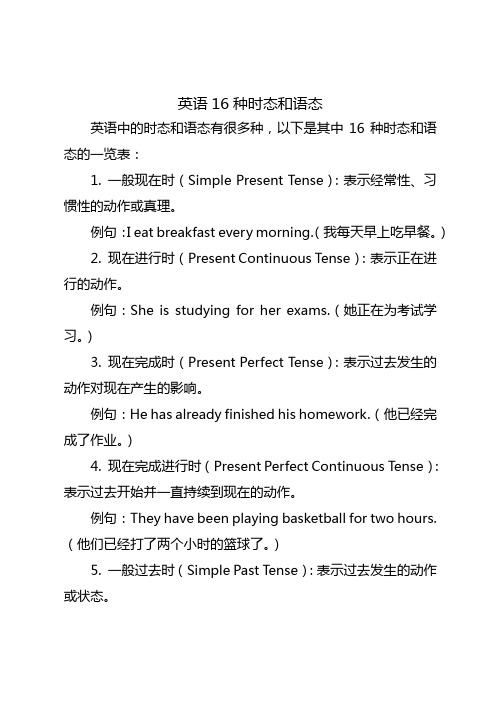
英语16种时态和语态英语中的时态和语态有很多种,以下是其中16种时态和语态的一览表:1. 一般现在时(Simple Present Tense):表示经常性、习惯性的动作或真理。
例句:I eat breakfast every morning.(我每天早上吃早餐。
)2. 现在进行时(Present Continuous Tense):表示正在进行的动作。
例句:She is studying for her exams.(她正在为考试学习。
)3. 现在完成时(Present Perfect Tense):表示过去发生的动作对现在产生的影响。
例句:He has already finished his homework.(他已经完成了作业。
)4. 现在完成进行时(Present Perfect Continuous Tense):表示过去开始并一直持续到现在的动作。
例句:They have been playing basketball for two hours.(他们已经打了两个小时的篮球了。
)5. 一般过去时(Simple Past Tense):表示过去发生的动作或状态。
例句:I went to the park yesterday.(昨天我去了公园。
)6. 过去进行时(Past Continuous Tense):表示过去某一时刻正在进行的动作。
例句:She was watching TV when I called her.(我给她打电话时,她正在看电视。
)7. 过去完成时(Past Perfect Tense):表示过去某个时间点之前已经完成的动作。
例句:He had finished his work before he left.(他离开之前已经完成了他的工作。
)8. 过去完成进行时(Past Perfect Continuous Tense):表示过去某个时间点之前一直在进行的动作。
- 1、下载文档前请自行甄别文档内容的完整性,平台不提供额外的编辑、内容补充、找答案等附加服务。
- 2、"仅部分预览"的文档,不可在线预览部分如存在完整性等问题,可反馈申请退款(可完整预览的文档不适用该条件!)。
- 3、如文档侵犯您的权益,请联系客服反馈,我们会尽快为您处理(人工客服工作时间:9:00-18:30)。
时态和语态Do you remember these sentences?A man is hurt badlyHer lost books were usually returned to the library.It must be called a pen.Mark Twain wrote this book=This book __________by Mark Twain.被动语态的基本构成:be + 及物动词的过去分词表示时态表示被动要变化不变化例如:1.It is produced in China.注意一:使用被动语态的场合1.不知道或不必指出动作的执行者时。
如:(1)Computers are widely used in transport.2.强调动作的承受者时。
如:A library will be built in this city.注意二:“be + 过去分词” 并非都是被动语态,系动词be, feel, seem, look等词后面的过去分词已转化为形容词,作表语用,表示某种状态。
例如:1. I’m interested in ma thematics.2. He seems unsatisfied with his work.3. Tom was surprised at the news.注意三:某些动词用主动语态来表示被动含义lock, open, shut, move, read, sell, wash, write等动词,用来说明主语的性质特征而不强调被执行者的动作时,用主动形式表达被动意义,且常与not, hardly, well, easily, badly, nicely等副词连用。
如:1. The do or doesn’t open easily.2. Bikes of that kind hardly sell.注意四:1. need, want, require等动词以及形容词worth后面,常跟动词-ing形式,用主动形式表达被动意义。
如:This dictionary is well worth buying.2. easy, difficult, hard, heavy等形容词后面跟动词不定式,用主动形式表被动意义,并且该不定式与句子的主语须具备逻辑上的动宾关系。
如:What life will be like in the future is difficult to predict.3.不定式作定语,其逻辑主语是句子的主语、间接宾语或说话人时,用动词不定式的主动形式表被动意义。
如:She has an old grandfather to look after.4.“主语+系动词+to do”结构也是主动形式表被动意义, 主要用于“sth. +be to let / rent”或“sb. +be +to blame”结构中。
如:It’s not my fault. She is to blame.高中英语动词时态和语态专项练习题语境中的时态和语态具有灵活多变的特点,因此找出隐含于上下文中的时间信息,正确认定动作行为所发生的时间是解题的关键。
做动词时态和语态填空题时,常常按以下几个步骤:(1)注意题干所提供的信息,如语境、情景以及说话人的情感;(2)根据句中的时间状语以及一些副词判断时态;(3)考虑语态;(4)考虑时态的一致性。
另外,复习时,还要涉及到短暂性动词与延续性动词,这两个概念一定要搞清。
短暂性动词用于进行时态和完成时态都要受到限制动词的语态一般不单独考,而是和时态、语气和非谓语动词一起考,只是需要注意以下考点。
考点一:不能用于被动语态的动词和词组come true, consist of, take place, happen, become, rise, occur, belong, break out, appear, arrive, die, fall, last, exist, fail, succeedIt took place before liberation.考点二:下列动词的主动语态表示被动意义, 而且常与well, quite, easily, badly等副词连用。
lock ( 锁) ; wash ( 洗); sell ( 卖); read ( 读); wear ( 穿); blame (责备);ride (乘坐);write ( 写);Glass breaks easily. 玻璃容易破碎。
The car rides smoothly. 这车走起来很稳。
The case locks easily. 这箱子很好锁。
The book sells well. 这本书很畅销。
考点三:一些常用经典被动句型:It is said…, It is reported…, It is widely believed…,It is expected…, It is estimated…,这些句子一般翻译为“据说……”,“人们认为……”,而“以前人们认为……” 则应该说:It was believed…, It w as said…Fill in the blanks:1. Much of the carbon in the earth ____________ (come) from things that once lived.2. In the past two decades, research _______________ (expand) our knowledge about sleep and dream.3. Some proverbs ____________ (be) in the language for 1,000 years, for example, A friend in need is a friend indeed.4. ________________ (stand) at the gate was a young man in green coat.5. In 1991, after the Gulf War, Bush’s approved rating reached 91 percent, the highest level recorded since polling ________________ (begin) in the 19302.6. Seeing violence on television or reading about it in the newspapers every day ________________ (make) us tolerate crime more than we should.7. So far, Irving ______________ (live) in New York City for ten years.8. The patient ________________ (send) to another hospital before we got there.9. The second half of the nineteenth century _______________ (witness) the first extended translation into English of the writings of Eliphas Levi.10. All the worries they might have felt for him ________________ (drive) off by the sight of his cheerful face.Multiple choices:1. I wonder why Jenny ______ us recently. We should have hears from her by now.A. hasn’t writtenB. doesn’t writeC. won’t writeD. hadn’t writ ten2. Mary _______ a dress when she cut her finger.A. madeB. is makingC. was makingD. makes3. On Saturday afternoon, Mrs. Green went to the market,________ some bananas and visited her cousin.A. boughtB. buyingC. to buyD. buy4. The volleyball match will be put off if it ______.A. will rainB. rainsC. rainedD. is raining5. -----We haven’t heard of Jane for a long a time.------What do you suppose ______to her?A. was happeningB. to happenC. has happenedD. having happened6. ---Do you know our town at all?---No, it’s the first time I ________ here.A. wasB. have beenC. cameD. am coming7. ---- You haven’t said a word about my new coat, do you like it?---- I’m sorry,I ___ anything about it sooner. I certainly think it’s pretty on you. A. wasn’t saying B. don’t sayC. won’t sayD. didn’t say8. We were all surprised when he made it clear that he ___ officer soon.A. leaveB. would leaveC. leftD. had left9. I _____ Ping P ong quite well, but I haven’t had time to play since the new year.A. will playB. have playedC. playedD. play10. He will have learned English for eight year by the time he ______from the university next year.A. will graduateB. will have graduatedC. graduatesD. is to graduate11. Tom ______ back from France. Yesterday he ________ about it.A. just comes; toldB. has just come; told meC. came just; was told meD. just has come; was telling12. He said, “_______ much sand in the south of France.”A. There aren’tB. It isn’tC. It wasn’tD. There isn’t13. You shall have some ice-cream when you _________ you dinner.A. finishedB. finishC. will finishD. will be finished14. Thomas could fix your car. That ______ you quite a lot of money.A. savedB. has savedC. would saveD. was saving15.You can’t move in right now. The house ________.A. has painted B .is painted C .is being painted D .is painting16. Maria hasn’t visited her home in Spain _________.A. for many yearsB. since many yearsC. many years sinceD. many years ago17. When ______ the car, you’ll agree with me about it.A. you sawB. you’ve seenC. you would seeD. has been seen18. By next Saturday Tom ___________ a whole month without smoking a cigar.A. will goB. will have goneC. has goneD. has been going19. By the time he reached the dentist, the pain in his tooth ________.A. stoppedB. had stoppedC. Has stoppedD. as been stopped20. The old man _________ for three days when his son got back home.A. has been deadB. had been deadC. diedD. had diedKey:es 一般现在时,主语为不可数名词,谓语用单数2. has expanded 现在完成时3. has been 现在完成时4. Standing 过去进行时的倒装形式5.began 一般过去时6. makes 一般现在时,动名词做主语,谓语用单数7. has been living 现在完成进行时8. had been sent 过去完成时的被动形式9. witnessed 一般过去时10. were driven 一般过去时的被动Key:1~5: ACABC 6~10:BDBDC 11~15:BDBCC 16~20:ABBBB。
